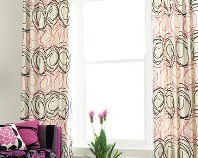Eastern Wisdom
 September 4, 2007
September 4, 2007 Jay Johnson -- Several years ago, New York City interior design Irwin Weiner and I signed up for an American Society of Interior Designers (ASID) trip to China. The attractions were twofold: to see Chinese culture and city life and to study feng shui.
We got to climb the Great Wall outside of Beijing, and it is certainly one of the essential sights to see before you die. We hit it lucky on our trip. Chinese Television was shooting the top performers at the Wall in front of crowds of soldiers, a tribute to their earlier lifesaving efforts in one of China's provincial floods. As we took to the ancient steps, orchestral music filled the air around us and beautiful voices accompanied our climb.
I decided then and there that life is always better with a soundtrack!
 We visited the Forbidden City in Beijing. We took a canal boat ride and went on a beautiful garden tour in Suchow, the Venice of China. We stayed at the Art Deco Peace Hotel on the Bund in Shanghai and shopped for painted imperial art scrolls. I found a beauty--a hardy winter flower growing out of rocky ground, which my art interpreter said symbolized strength in adversity.
We visited the Forbidden City in Beijing. We took a canal boat ride and went on a beautiful garden tour in Suchow, the Venice of China. We stayed at the Art Deco Peace Hotel on the Bund in Shanghai and shopped for painted imperial art scrolls. I found a beauty--a hardy winter flower growing out of rocky ground, which my art interpreter said symbolized strength in adversity.
The food was as exotic as the setting, but our fellow ASID travelers sometimes didn't groove to cloudy soup (the cloudy broth hid oversized black carpenter ants at the bottom of the bowl) or the snake's blood and pickled snakeskin. I tried some of the blood and now feel I have closer affinity to vampires. Irwin and I loved the Magnum bars, delicious ice cream on a stick that was their equivalent of Dove Bars.
Our feng shui instruction, however, took the cake. It was infinitely fascinating! For the uninitiated, feng shui is the ancient practice of placing architectural elements and decorating your interior spaces in harmonious ways that maximize the flow of good "chi" or energy. Practitioners are very serious about this science and art form, and skyscrapers throughout Asia -- even for American companies like Wall Street Journal and Chase Bank -- have all used feng shui experts to carefully lay out their buildings and interior rooms in specific beneficial ways.
Because feng shui has gotten tied up in the Chinese Communists' collective mind as "religion," which it really is not, they officially frown on the practice of feng shui. We found this amusing as we were being taught feng shui classes in one of the largest science and technology colleges in China, in bustling Nanjing.
Feng shui is the perfect sceptical person's practice. One of the precepts is to make a change in your surroundings and simply observe the results. If bad things happen, hey, you've made a bad change. If good things happen, you've made a better change. Learn from these observed results and keep modifying and changing your surroundings to maximize the good results. Over the years, feng shui practitioners have made copious and detailed observations of how buildings should relate to different natural land forms, how beds should be placed for maximum restful sleep in bedrooms, and where to place your desk in a busy office so as to maximize your money-earning potential. Precepts and observations go as detailed as to the makeup of materials in furniture (wood, metal, etc.), the best colors to maximize benefits in different parts of a room, and where to beneficially place doors, toilets, stoves, sinks, and other household items.
One New York book editor I know edited a feng shui book, decided to experiment with her new knowledge, changed the position of the desk in her office, and then went into her boss and asked for a raise. She more than doubled her salary.
She's not saying the desk move clinched the raise for her, but she said things just felt better when she rearranged her furniture according to some kind of ground rules. Because she felt better about her surroundings and herself, she got up the courage to request a long overdue pay increase.
Volumes and countless blogs can be written about our feng shui adventures in China, and I will add more in future columns, but I wanted to stop here and make a simple design point. Sit quietly in any room of your house or apartment. Look around at the way your furniture is arranged. Does it flow well to your eye? Are there good traffic patterns, or is something blocking the flow and do things seem a bit forced and unnatural? A good book on feng shui will strike the novice as common sense in practice, but without a book you can go a long way towards making your life feel a bit better by rearranging the furniture.
Last week we researched one of our favorite interior designers, UK-born Nina Campbell, and she wrote about her childhood experiences of helping her mother move furniture around in their apartment. Her mother would just get the bug to change things around, make arrangements feel better and more interesting, and prevent the family from getting stuck in a rut. She probably wouldn't say she was "improving the flow of chi" and maximizing feng shui principals. But it just makes sense to accept that your surroundings have a profound influence on how you feel, how you feel has a profound effect on your relationships and your job performance, and so on.
In the over 200 home videos contained in my Design2Share Video Diary on YouTube, you will see examples where I have taken my video camera -- a sturdy palm-sized Radio Shack $99 camtastic special -- and observed the decor of many interiors. This week's Video Diary takes you to a New York City apartment, inside a bedroom, and I make comments based on the feng shui principals I picked up in China. Note that I am not an expert. Four days of "tourist courses" does not an expert make. But I knew that this interior had been carefully vetted by a feng shui practitioner, and I wanted to see if I could spot the changes he had encouraged in the interior. Watch my Feng Shui Bedroom video and armchair feng shui quarterbacking.
I think we can all learn something from Eastern Wisdom. I'm not talking about a specific body of work like feng shui. I'm talking about the wisdom of being quiet and calm, sitting down, and observing what's around you. Nothing could be smarter.
What do you think about feng shui? Do you know anyone who has made changes to their interior based on these principals? Thank you for posting your comments here . . . .
Photo Credit: Forbidden City from the Park Plaza Hotel in Beijing













